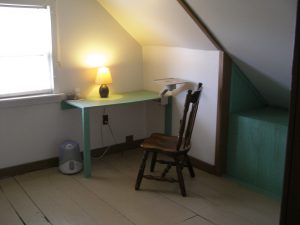by Jenny Rose | Apr 2, 2022 | A Flourishing Woman, The Journey
Unless the sky falls (again), we will be moving in less than a week. It’s hard to believe. In fact, it’s impossible to believe, but that’s okay. Today is real, and I know what I need to do right now. The future can take care of itself.
As I moved around the kitchen early this morning, feeding (and tripping over) the cats, making breakfast, heating water for tea, watching the sky lighten, it occurred to me the last seven years in this old farmhouse have taught me a magnificent lesson.

Maine Farmhouse and Barn
When I moved to Maine, I had a solid idea about what I was moving into, a whole set of expectations and dreams, none of which turned out to be real.
The loss of my fantasies was heartbreaking and took me years to process. During that time, I started this blog and later remodeled it, finished my first book, wrote my second, and began my third, started publishing my fiction serially on Substack, put everything I’ve learned about emotional intelligence into action, grew deep roots in my community, found a great job I love, and became part of a second family.
At the same time, I experienced disempowerment in terms of my living space and physical surroundings. Never before have I lived in a place where I had so little power to respond to my needs and preferences, and never have I been so overwhelmed with maintenance tasks I could not take care of.
Because of my emotional intelligence training, my disempowerment was visible to me, and I was able to turn towards what I did have power over, again and again, until it became second nature. It didn’t feel good, but it was invaluable practice in managing my own power, at recognizing my own power.
Always before in my life, I’ve had plans and projects, things I wanted to buy, walls I wanted to paint, the ability to rearrange furniture, make repairs, have new shelves built, and discard what was no longer useful. Such activity gave me a great deal of pleasure and was thoroughly distracting. It was never finished, so I stayed firmly focused on externals.
In this house, that distraction has been unavailable. To stand in my own power has been to stand still with myself, to work internally, to feel my feelings, create, stretch, grow, learn, explore. It’s been lonely. It’s been uncomfortable. It’s been transformative. It’s been internal, invisible, and has nothing to do with a shiny presentation.

Photo by Alex Iby on Unsplash
Most of us would acknowledge real change and healing come from the inside, not from the surface. But understanding that intellectually is not the same as spending years living it. I would never have voluntarily given up the power to manage my surroundings. When I realized it was happening I had a choice to make, and I chose to explore this new, unexpected territory.
That choice is one of the best I’ve ever made.
I have learned a dream home, a dream wardrobe, a dream body, a dream library, is not a life. What others see of me and my possessions and home is not me. My presentation has nothing to do with my state of health, presence, and groundedness.
Our new home is old, though not as old as this farm, and it needs some work. Sure, it needs new exterior paint and other cosmetic help, but that’s not where I’ll start. Those changes are fun and everyone can see and appreciate them, but the invisible, internal issues like plumbing, wiring, and insulation are what will really make a difference to my experience living there.
The looks of the new house are not what matters. It’s the life we create inside it that matters.
The color of my hair doesn’t matter. It’s what’s inside my head that matters.
The clothes I wear don’t matter. It’s the health and peace in my body that matter.
Attaining perfection (and perfect control) of my space is not what matters. It’s the ability to manage my thoughts and feelings, maintain integrity, and live well that matter.
In these last few days of packing, sorting, and endless tasks and details, at every step I’m thinking about what I learned and how grateful I am for the lesson. I didn’t choose to learn it. I wouldn’t have volunteered to learn it. I was forced into it, tricked into it, even.
But that’s not important. My life has consistently taken me exactly where I need to go, in spite of how much I whine and complain about some of the places I’ve been. Now, just ahead, is a whole new chapter.
I wonder what I will learn.
(Next weekend we’re moving, so you won’t see a post here from me. I’ll be back in two weeks!)

Photo by Michal Balog on Unsplash
by Jenny Rose | Mar 12, 2022 | A Flourishing Woman, The Journey
In the Tarot, there’s a card called The Tower. It’s traditionally illustrated with a tower falling. The meaning of the card is destruction, chaos, danger, crisis, and unforeseen change. And liberation.
Liberation.

By K Mitch Hodge on Unsplash
Some years ago, in the months before I moved from Colorado to Maine, my life unraveled in several painful ways. During those months, I pulled The Tower card from my Tarot deck (78 cards) time after time, though I always shuffle and cut the deck thoroughly before I draw cards. I couldn’t get away from it.
It didn’t tell me anything I didn’t already know. I felt for a time as though my life would never be anything else. I would never escape the falling tower. I didn’t think much about the liberation part, because when our lives are toppling we don’t think about anything except surviving the collapse.
I had a crate of odds and ends of wood from building a privacy fence and a deck. I pulled it out of my shed and built a tower on a table on the covered deck outside my front door. I hadn’t played with blocks since my children were young. The chunks of wood were in all kinds of odd shapes, and building the tallest tower possible was an absorbing task.
When my tower was finished, I left it standing for a few hours or a day or so, enjoying it as I went about my life and in and out of my little log cabin. Then, when the time was right and I needed an outlet for my fear and frustration, I would knock it down. Hard. Loudly. I would obliterate it, sending the pieces of wood flying, sweeping the tabletop clear. It was a practice of surrender. If the tower was inevitably going to fall, I wouldn’t try to prop it up. I’d create a glorious, earth-shaking, no-holds-barred collapse. I wouldn’t look away or pretend it wasn’t happening or try to escape or soften the situation. I would face my fear.
After a while I built it again.
And again.
And again.
I did that for months. I built and knocked down more than 100 towers while I pulled the card over and over again.
I had a dream a couple of weeks ago about wandering through a field of rubble from a fallen tower. In spite of the destruction, it was a peaceful, sunny, summer landscape. I felt no sense of dread or doom. There had obviously been a violent and frightening collapse, but it was over now, and all was serene. I found some scattered objects amongst the stone rubble. Some things were intact, but others were smashed to pieces. I was thinking about sorting through the wreckage and salvaging material for a new tower and a new life.
I wasn’t scared. I was peaceful.
I was starting again. I’ve done that before. The fear and anxiety, the feeling of oncoming disaster, were past. The worst had happened and now I was on the other side of it.
I was excited about piecing together a new tower.
When I woke, I thought, “That damn tower!” and smiled to myself.
We are now working with a fifth contract for the sale of this property. That’s right. Number 5. Gas has more than doubled from last year’s price. The cat food shortage goes on and on. Prices for everything are skyrocketing. I just received our power bill, which has doubled from last month, though our usage is slightly less. We are on the edge of war, thanks to Russia.
I remember this feeling of the tower falling.

Photo by Dan Gold on Unsplash
But I also remember the liberation on the other side. I remember starting afresh. I remember taking a long journey into health and healing, into creativity, into an entirely new life. In some ways, for the last seven years I’ve been working in a field of rubble, carefully salvaging and sorting the usable from the discards. I’ve thought long and hard about the kind of life I want to build now, and about my needs and resources.
I’m not on the other side yet. One of these days I will be, and I feel that day coming closer, though I don’t know how or when. I lie awake on windy nights and wonder if, metaphorically speaking, the wind will knock down the tower. Or will the rain take it down in the end? Or a spring ice storm? Or a completely unlooked-for earthquake, fire, or flood?
Or will it gently collapse, stone by stone, falling quietly into ruin around me?
Whatever happens, there will be debris and rubble. Some material will be salvageable.
I will start, as I have before, with what I have, with what remains, with myself.
When my last tower fell, I learned two important things. One is that a home, no matter how beloved, is not a life. It cannot keep me safe, happy, and secure for the rest of my days. It cannot substitute for my connections, contribution, or self-love. The place I live does not define me.
The second is that I am not my things. My security, identity, memories, strength, courage, and creativity do not reside in objects around me, the clothes I wear, the furniture I use, or the dishes I eat off of.
Many people new to the Tarot fear The Tower card. Few of us welcome destruction, chaos, danger, crisis and unforeseen change. However, change does come. Towers do fall. And once the terror and tumult have passed, we find ourselves in a new world with a chance to make a fresh start.
We might not have wanted to be liberated from anything. Or, on the other hand, we may have longed for liberation. In any case, we are suddenly dropped into a different life. The tower fell. We take some time for recovery.
Then it’s time to rebuild.

By K Mitch Hodge on Unsplash
by Jenny Rose | Feb 26, 2022 | Choice, Power
We are paradoxically stuck in the process of moving. Sometimes I feel we’ll never stop moving, and we’ve never done anything except slog through moving. Not true, of course. It’s only been about 4 months.

Photo by Michal Balog on Unsplash
One of the fun things about moving, for me, is creating a new home. Rearranging possessions and furniture. Making new mental maps of space and how to navigate from the bedroom to the bathroom to the kitchen. I’m looking forward to that, but every day it feels farther ahead in an unobtainable future.
I’m figuring out strategies to help myself through this.
Right now, I’m metaphorically rearranging my mental furniture.
Most people arrange their living rooms around the focal point of a screen. It’s funny to think that’s only been true for the last 100 years or so. I would hardly know what to do with a living room that does not contain a screen.
Currently, my mental and emotional living room is overwhelmed by a big screen on which the reality show Moving is endlessly and relentlessly playing. Attached to the screen, of course, are a sound system, remote controls, and all kinds of additional tech and equipment. Beside the screen is a neon calendar counting down the weeks to yet another closing date (our fourth), and along the bottom of the screen a continuous feed of rising interest rates and costs for everything from cat food (if you can find it) to heating oil. I don’t have room to breathe. I can’t escape the noise. I can’t pull my attention away. I feel imprisoned and disempowered.
I want it to be over, to turn it off, to turn away, to think about something else.
I have hot, red fantasies of sledge hammers and the sound of smashing glass. (This is an old fantasy. I am a secret wannabe serial TV screen murderer. Turn off the effing TV!)

Photo by Frank Okay on Unsplash
I can’t do much about the fact that the only sheets I still have unpacked are flannel, boxes are stacked to the ceiling in one room, another room is filled with empty boxes, tape, packing material, markers, and objects waiting for the right sized container. I’m not going to start unpacking because the weeks are dragging on.
But I can do something about my internal landscape, and I have got to get that screen out of my living room! Turning it off is not enough. It has to go, along with the sound system, remote controls, calendar, and scrolling rising interest rates.
I decided, a few days ago, to Stop Caring. Just stop. At least, Stop Caring so much.
I did Stop Caring for a day or two. A friend asked me what I did over the weekend, as she knew I was going to Stop Caring about Moving. I told her I worried about not caring, and she laughed. Will I stay stuck forever if I don’t Care? Am I supposed to Care? Is Caring some integral part of the process? Is something wrong with me if I Stop Caring? Am I abandoning or betraying the cause? Am I giving up?
I know. It’s ridiculous. But all you worriers understand. I know you do!
Anyway, I realized after I Stopped Caring I was feeling depressed. And I asked myself, is not Caring the same as sinking into apathy and depression?
Well, if so, that’s not good. That’s not what I want, either.
It was a relief to Stop Caring for a while. But I don’t want to Stop Caring about everything. I mean, I still have work to do, and people to love, and words to write, and the cats to enjoy. I still want to listen to music and light candles and exercise. I still want to read, and laugh, and hang out with friends.
What I want is to push back against the feeling nothing matters except Moving, that there is no life until we’ve successfully made this transition. I don’t want to watch the clock, watch the calendar, watch my email, watch the interest rates, worry about contracts, and think about all the places and ways I have no power in this process. I want to Stop Caring about all that.
I have to decide what to care about and what not to care about, and then I have to be constantly present with where my attention is and disciplined about redirecting it.
Oh, good. Just what I need. More work.
If we don’t arrange our living room around a screen, how do we use that space? What can I look at instead of the screen?

Photo by Pop & Zebra on Unsplash
A window and the world beyond it. The weather. The sky. The light. Birds and trees and all the other life responding to spring, feeling the call of mating, foraging for food, living their lives as temperatures moderate and the light strengthens.
A bookcase. If you don’t love books, this makes no sense to you. If you’re a bibliophile, I needn’t say more.
A fireplace, or hearth, or stove. A source of warmth, light, alchemy, primal comfort.
A piece of art.
A spiritual altar; maybe something as simple as a candle.
And so on.
The point is I have a choice about where my attention is and what I care about. Clock and calendar watching are not effective or useful. Neither is obsessing over the interest rate or compulsively checking my email and the latest real estate listings. In fact, those activities add to my stress and make time slow down. Far better to Stop Caring about the clock and calendar, shut the computer, and channel my Caring into enjoyable things, creative things, small tasks and pleasures anchoring me to everyday life right here, right now, in the pre-spring season in central Maine.
The places in which I have power deserve my Caring and attention. They deserve my effort and presence. I don’t need to squander my love and Care in places where it’s neither effective nor appreciated.
It’s my living room, and I’m choosing what’s in it.
Get the sledgehammer.

Photo by Josh Applegate on Unsplash
by Jenny Rose | Feb 12, 2022 | A Flourishing Woman, The Journey
I’ve written before about rewriting our personal narratives. I’m revisiting the idea, this time in terms of rewriting the past.
Pete Walker’s material on complex post-traumatic stress disorder suggests revisiting old traumas remaining in our memory as painful, nonhealing wounds, and rewriting. He talks about it in terms of time travel. One goes back, as an adult, into memories of childhood and enters the scene as a new character, creating a new and different narrative. Our adult selves can defend our child selves, shield them, help them explain themselves, provide comfort to them, and, if needed, remove them before whatever terrible experience occurred.

Photo by Angelina Litvin on Unsplash
Intrigued, I tried this method, and I was shocked, though I know the power of stories, at how well it worked and how much fun it was. Not only has it helped me heal from past trauma, it also strengthens my ability now to automatically stay on my own side and defend myself.
Seth Godin also talks about this concept. His language is “rewriting the script.” Same idea, slightly different presentation. Godin is business oriented, while Walker is psychology oriented.
Godin suggests, instead of saying to ourselves “here we go again,” we simply rewrite the script this time, which means we throw away our expectations and take each experience as a fresh one, rather than another terrible iteration of something in our past.
This is powerful for me as we navigate the process of moving house. I’ve done it more times before than I want to count, and I’ve always found it deeply traumatic, but this time is different. In spite of broken contracts, changing timelines, obstructions and reversals, and the usual financial and physical stresses, I’m managing to stay grounded and balanced. It feels like a rough patch, for sure, but I don’t feel traumatized. I have moments of amusement and even more moments of curiosity. What on earth will happen next? How will this all work out? Where will I be sitting in 6 months?
Old traumas and wounds are just that – old. We don’t have to insist new, similar experiences cut as deeply. It is a choice, although not an obvious one. We could just tear up our old scripts, the ones that hurt us, the ones that never work out for us, the ones filled with fear and heartbreak, and write a new one. Now does not have to be the same as then.
In yet another way to think about this, I came across advice from a writer on how to appreciate one’s progress. She, too, suggested time travel. If we feel stuck and as though we’re making no progress, and never have, and never will, and what person X told us way back when we were children, that we’ll never amount to anything, seems a curse we can never lift, we can sit quietly with ourselves and think back a year, or five, or ten. Stepping back helps us gain perspective and see exactly how far we’ve come, how much we’ve learned, how much we’ve grown. What if we went back, in imagination, to cheer on the self we were a year ago, whispering to them of all the wonderful progress ahead?
Scripts and storylines can be changed. We don’t have to give them our power. It’s so easy to forget that. It takes an act of presence and will to change the script and reclaim our power, but we can let go of our limiting expectations and beliefs and allow ourselves a different kind of experience. Not here we go again, but here’s a new experience – I wonder what will happen?
Sometimes all we need to do is shift our gaze from the hopeless and frightening places where we have no power and focus on the places we do. If we can stay there, rest there, live there, the chaos and tumult, though unpleasant, won’t knock us down and trample us. Such times pass by, pass over without traumatizing us, and we’ll come out on the other side more resilient than ever.

Photo by Leon Liu on Unsplash
by Jenny Rose | Jan 8, 2022 | A Flourishing Woman, The Journey
All my life I’ve felt traumatized by how frequently I’ve moved house. My general insecurity makes uprooting myself a fearful ordeal.

Maine Farmhouse and Barn
This time, as we go through the process of selling this old farm and searching for a new place, I’m realizing for the first time how valuable my experience of moving is. My resentment about it is falling away.
I know most people approach finding a new home from the will-this-place-suit-me direction, and that’s probably practical and sensible. I can and have done that many times, but I also spend a lot of time thinking about whether I will suit the new place, and being curious about how I might fit my life into it rather than forcing it to accommodate me.
I do this because, as I’m realizing now, every place I’ve lived has changed me, challenged me, and shown me new aspects of myself. I’ve never had much money and therefore been unable to have a wide choice or completely renovate, so I’ve learned to adapt and adjust to wherever I am. For the first time in my life, I’m seeing what strength and power lie in that kind of resilience.
I’ve lived in homes, apartments, dorms, a trailer, a log cabin, and my parents’ home (as an adult). I’ve rented and I’ve owned, bought and sold, and been a landlady. I’ve lived with husbands, my kids, assorted animals, and friends. I’ve lived by myself. I’ve lived in large places with ample storage and closets and small places with one closet in the entire house.

Now, as I approach my 60s, I think I know a lot about what I need, what’s important, and how adaptable I am. Of course, I thought that at 50 when I came to Maine, but this old farmhouse taught me a great deal more. And the new house will teach me yet more. During my time in this house, I also became a minimalist, which has had a huge impact on my priorities and the amount of stuff I manage.
Leaving the place I know, no matter what this house’s challenges, is hard. I am, at least, familiar with the current problems and challenges. But I also know what I love; I’m already grieving the loss of this beautiful 26 acres, the gardens, the wildlife, the views out the windows, the way the sun comes into my little attic aerie, and the shrill spring song of the peepers in the pond.
I realize, however, that the next place I live will present me with new joys. I don’t know what they will be. They won’t be exactly like what I’m leaving. But a new space holds new possibilities and new discoveries, along with fresh challenges.
The thing about limits and challenges is the opportunity they hold. I’m excited by the prospect of creatively solving problems I encounter. One of the good things about having little financial resource is that I’ve been forced to rely on creative, low-cost solutions. If one doesn’t have money to throw at problems, one has to find another way.
Finding another way has always been a journey worth taking for me, a journey into my own power, ability, and creativity. Without the help of abundant money, it can seem like a long, slow, journey, uncomfortable and occasionally even tortuous, but filled with discovery and satisfaction. The new space and I will work together to make something functional and beautiful. We’ll find out about one another. We’ll take care of one another.
We’ll make a new home together.

Jenny’s attic is waiting for her. Fall, 2014












